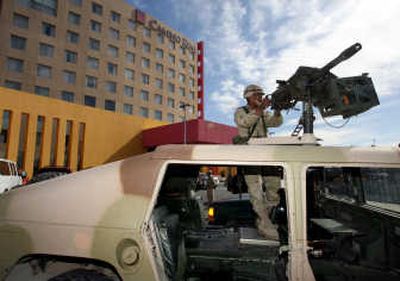Mexican soldiers pour into troubled border town

CIUDAD JUAREZ, Mexico – The government of President Felipe Calderon on Thursday began a military surge of more than 2,500 soldiers and federal agents into this besieged border community in an attempt to tamp down a bloody drug war that has authorities jittery on both sides of the border.
The crackdown comes as a senior U.S. law enforcement official cautioned that Juarez faces a prolonged drug war – much like Nuevo Laredo in recent years – that’s gradually spilling over into the Texas side of the border.
“Operation Chihuahua” – named after Mexico’s biggest state, nestled against New Mexico and Texas – is aimed at restoring law and order in a region that many say has grown lawless.
“In this fight, Chihuahua is not alone,” said Mexico’s Interior Secretary Juan Camilo Mourino, who was accompanied by the nation’s secretary of defense, attorney general, Chihuahua’s governor and the mayor of Ciudad Juarez. “In this battle, no group will be able to withstand the government’s force.”
The buildup of soldiers began Wednesday evening and will continue through Saturday.
Operation Chihuahua involves 2,026 soldiers and 425 federal agents, plus intelligence experts, investigators and forensic specialists. The goal is to control all access points into and out of the city, said Mexico’s Defense Minister Guillermo Galvan Galvan.
Within hours of beginning the operation, soldiers took over the police department’s communications operations, and Mayor Jose Reyes Ferriz said a clean-up of the police department is under way. Starting Monday, soldiers will set up 46 checkpoints throughout the city, including international crossing points leading into and out of Texas and New Mexico. And soldiers will be checking for unregistered weapons and searching police cars for any possible links to drug cartels.
Attorney General Eduardo Medina Mora stressed that the chaos in Ciudad Juarez and elsewhere in Mexico – more than 5,000 killings across Mexico in the last two years have been linked to drug violence – is not a sign of cartel strength, but “a sign of their weakness, decomposition and deterioration. It will take time to eradicate them.”
Across the border in El Paso, Special Agent-in-Charge John “Jack” Riley, of the Drug Enforcement Administration’s El Paso office echoed those comments. In an interview before the crackdown was announced, Riley lauded cooperation with his Mexican counterparts, calling relations and “levels of trust, the best I’ve ever seen.”
Riley cautioned that the battle in Juarez is a “protracted one. There won’t be any winners, or losers, anytime soon.
“They’re not sharing the pie,” he said. “Rather these thugs, driven by greed, are cutting the pie up. In the process they’re weeding each other out. Unfortunately, this will go on for a while and we’re likely to get a spillover.”
David Cuthbertson, the FBI’s special agent-in-charge in El Paso, said the agency is watching closely for a possible spillover.
“If there is a change of the guard in Juarez, will that lead to gang warfare on the El Paso side?” he asked. “That’s something we’re keeping an eye on.”